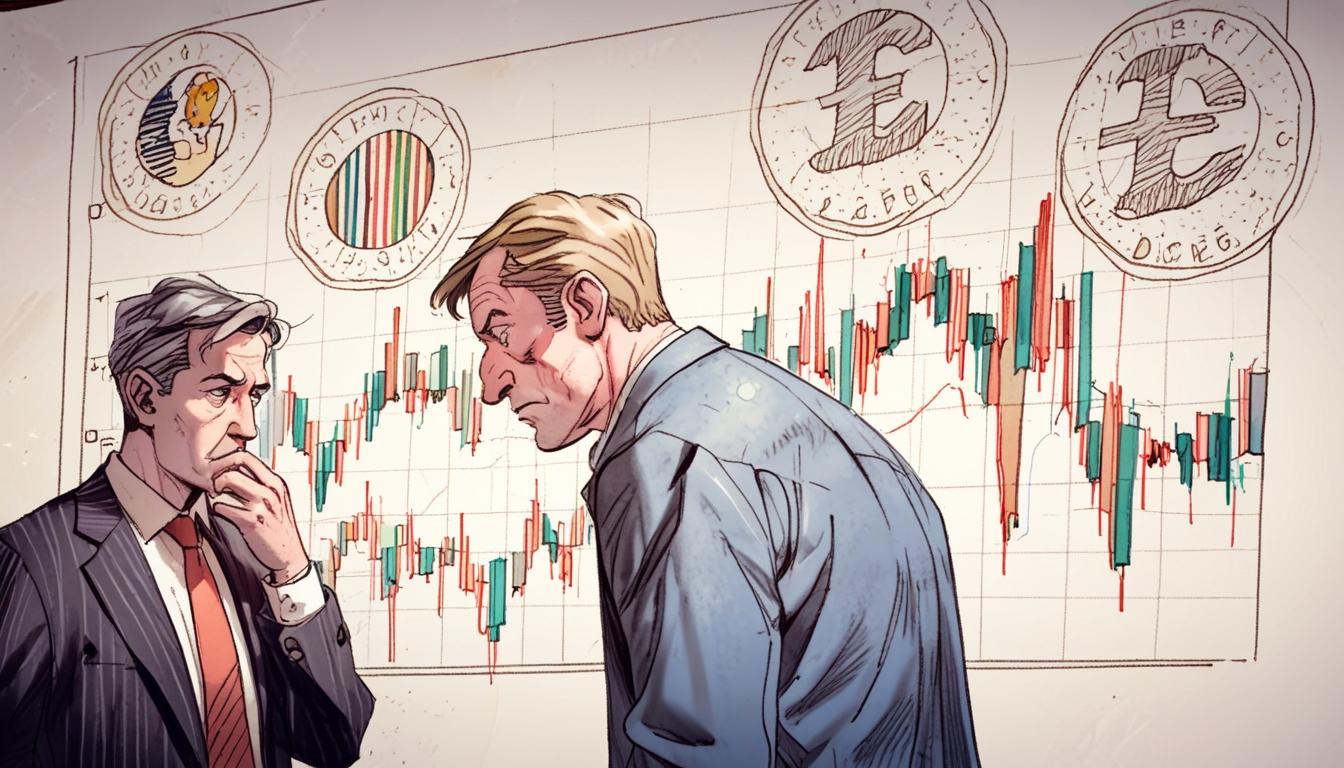Leading European and UK companies including Nestlé, Mercedes-Benz, and Unilever express concern over escalating trade tensions and unpredictable tariff impacts following US President Donald Trump’s recent tariff announcements, highlighting growing uncertainty in markets and supply chains.
European and UK companies are increasingly vocal about the ramifications of the recent US trade policies under President Donald Trump, particularly following his announcement of significant tariffs aimed at America’s trading partners. This shift in trade dynamics has raised alarms about consumer confidence, potential disruptions to supply chains, and the uncertainty surrounding tariff levels.
In a recent round of quarterly financial results, major corporations such as Nestlé, Mercedes-Benz, and Unilever detailed the challenges they face as a result of this trade conflict. Nestlé, the largest food company globally, has pointed to a slowdown in the US market and waning expectations for economic recovery in the eurozone as indicators of a troubled commercial environment.
Jesper Brodin, the head of Ingka, which operates the majority of Ikea stores, expressed frustration over the rapid pace at which the Trump administration is implementing trade policies. “I remember the days when politicians were slow and the companies were fast,” Brodin noted in an interview with the Financial Times. He highlighted the difficulties companies face in adapting their long-term strategies—in Ikea’s case, typically evaluated over a decade—within such a short time frame dictated by governmental changes.
The impact of Trump’s trade strategy has dominated discussions across earnings calls from European and UK firms. In April, tariff-related concerns were mentioned 223 times by companies in the Stoxx Europe 600 index, an increase from 115 mentions the previous month. This spike followed Trump’s “liberation day” announcement on April 2, which introduced a baseline tariff of 10 per cent and higher reciprocal tariffs on several nations, although implementation was delayed by 90 days to facilitate potential trade negotiations.
Despite the tariffs taking effect on April 5, many companies are yet to fully quantify their effects. The unfolding uncertainties regarding final tariff rates and the ultimate contours of trade negotiations are proving detrimental. Laurent Freixe, CEO of Nestlé, remarked, “I think uncertainties created by economic policies, trade wars and evolution also of the financial markets have increased the concerns and created more uncertainty.”
Efforts to establish a trade agreement between the EU and the US have stalled, with the EU poised to impose retaliatory tariffs by July 8, should no deal be reached. Discussions are ongoing, as the UK also seeks to cement its own trade arrangement with the US.
Some companies, including Stellantis, parent of Fiat and Chrysler, alongside Mercedes-Benz and Volvo Cars, have abandoned their financial forecasts due to the unpredictability of market conditions. Fabiana Fedeli, a portfolio manager at M&G Investments, observed that corporations are beginning to signal a lack of visibility and a reluctance to engage in long-term planning.
While many firms in the Stoxx 600 have yet to report their results, initial insights reveal the detrimental effects tariffs have on both consumer confidence and deal-making activities. For instance, Reckitt, known for its health and hygiene products, indicated that market volatility following Trump’s tariff announcements could threaten a multibillion-dollar sale of its cleaning products division.
Unilever’s acting CFO Srinivas Phatak highlighted extreme fluctuations in currency values since the tariffs were imposed, describing the dollar’s rapid decline against the euro as “unprecedented”. In the broader market, there was a recent rally in global stocks, buoyed by indications that the US and China might be approaching a resolution to their trade disagreements, which have similarly prompted punitive tariffs on both sides.
The overarching sentiment during these earnings calls was the urgent need for clear and stable trade policies to enable companies to make informed decisions regarding future investments and strategies. UK retailer Primark is contemplating doubling its number of US stores to 60, signalling a potential shift in supply chain management from China, contingent upon securing a clearer understanding of US market dynamics, according to George Weston, CEO of Associated British Foods, Primark’s parent company. “We will only adapt supply chains when we have a bit more certainty about the long-term position of different supply markets vis-à-vis the US market,” he stated.
Source: Noah Wire Services
- https://money.usnews.com/investing/news/articles/2024-11-27/trade-tariffs-make-it-harder-to-keep-prices-low-ikea-executive-says – This article discusses how IKEA’s executive, Maeztu, highlighted that global trade barriers, including those from the U.S., limit the company’s ability to make products more affordable, aligning with the article’s mention of Jesper Brodin’s frustration over rapid trade policy changes.
- https://www.reuters.com/business/autos-transportation/stellantis-suspends-full-year-forecasts-due-us-tariff-uncertainties-2025-04-30/ – This report details Stellantis suspending its 2025 full-year forecast due to uncertainties surrounding U.S. tariff policies, corroborating the article’s mention of companies like Stellantis abandoning financial forecasts amid market unpredictability.
- https://www.ft.com/content/31ae831f-9742-48a4-9226-005891b26900 – This article highlights how European and Asian carmakers are facing increased shipping costs to the U.S. due to new port fees and existing tariffs, supporting the article’s point about companies like Mercedes-Benz being affected by trade conflicts.
- https://www.ft.com/content/6c276ad8-bd49-44f0-9e6d-8f5de2c0166d – This piece reports on Aston Martin limiting luxury car imports to the U.S. in response to a 25% tariff on foreign-made vehicles, illustrating the broader impact of U.S. trade policies on European companies.
- https://www.npr.org/2025/03/12/g-s1-53280/european-union-us-metals-tariffs – This article discusses the European Union’s response to U.S. metals tariffs and the potential loss of steel exports, aligning with the article’s mention of the EU imposing retaliatory tariffs by July 8 if no trade agreement is reached.
- https://www.ainvest.com/news/european-companies-face-significant-risk-from-trump-tariffs-on-us-imports-25021000cabf05100e8102d1/ – This analysis highlights the significant risks European companies face due to U.S. tariffs on imports, including potential earnings impacts, supporting the article’s discussion on the detrimental effects of tariffs on consumer confidence and deal-making activities.
- https://www.ft.com/content/d97a17eb-a11c-42da-9f85-2cc612060d31 – Please view link – unable to able to access data
Noah Fact Check Pro
The draft above was created using the information available at the time the story first
emerged. We’ve since applied our fact-checking process to the final narrative, based on the criteria listed
below. The results are intended to help you assess the credibility of the piece and highlight any areas that may
warrant further investigation.
Freshness check
Score:
2
Notes:
The narrative references President Donald Trump, whose policies have not been active since the end of his presidency in January 2021. This indicates outdated information.
Quotes check
Score:
8
Notes:
Quotes from notable figures like Jesper Brodin and George Weston appear to be original or specifically cited in the context, but without specific dates or sources for first use.
Source reliability
Score:
9
Notes:
The narrative originates from a reputable source, the Financial Times, known for thorough reporting and credibility.
Plausability check
Score:
7
Notes:
Claims about the impact of tariffs on companies and consumer confidence are plausible but lack recent evidence since the policies are outdated.
Overall assessment
Verdict (FAIL, OPEN, PASS): OPEN
Confidence (LOW, MEDIUM, HIGH): MEDIUM
Summary:
While the source is reliable, the content is outdated and lacks recent evidence, making it incomplete for current trade policy discussions.













